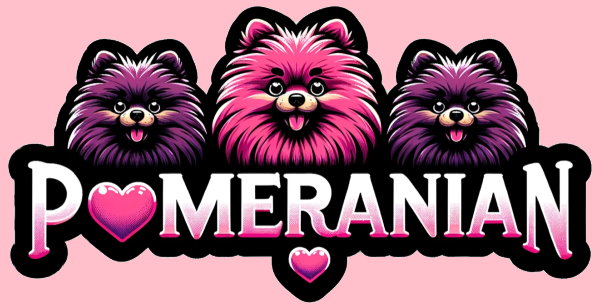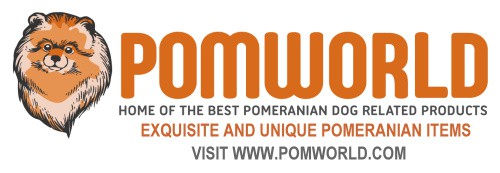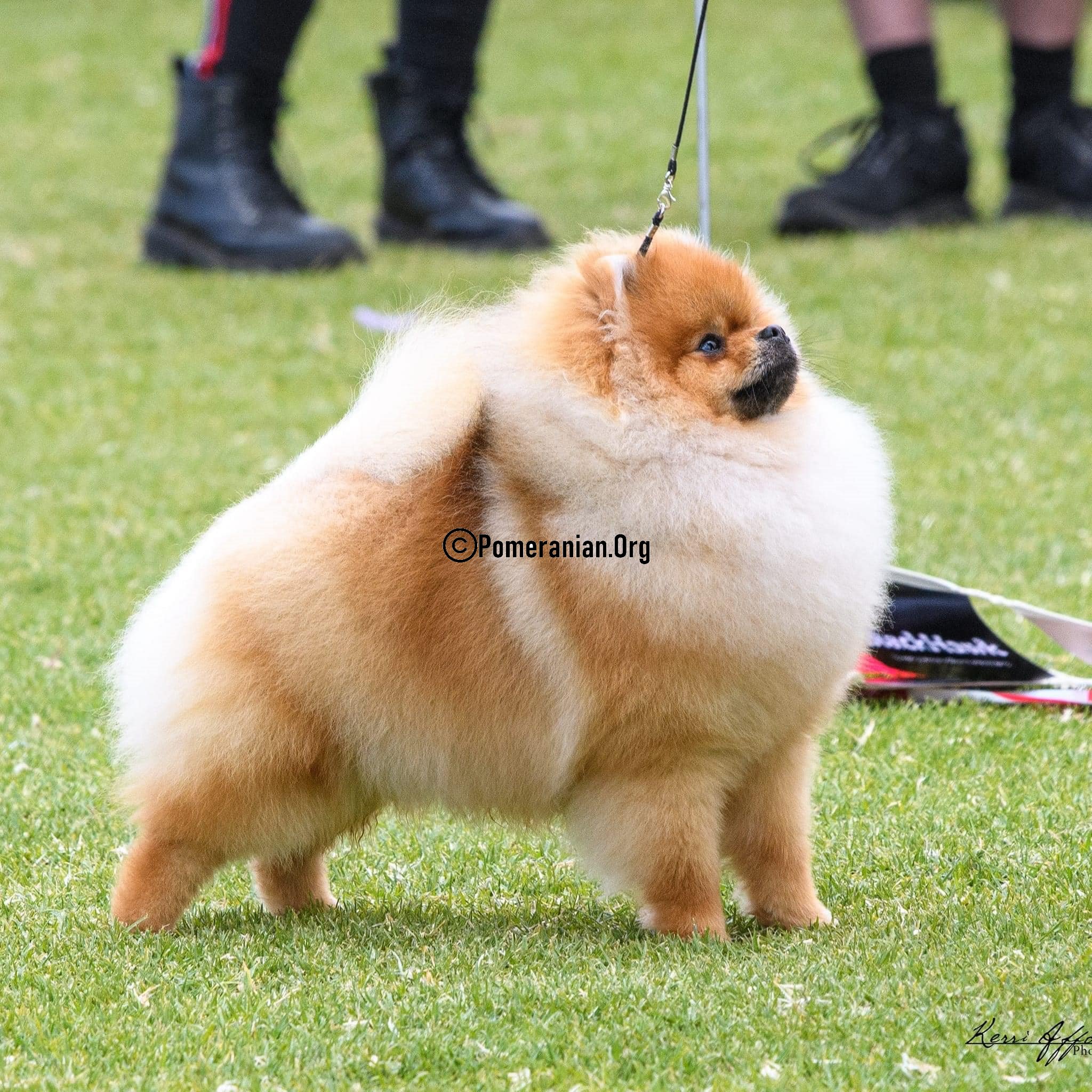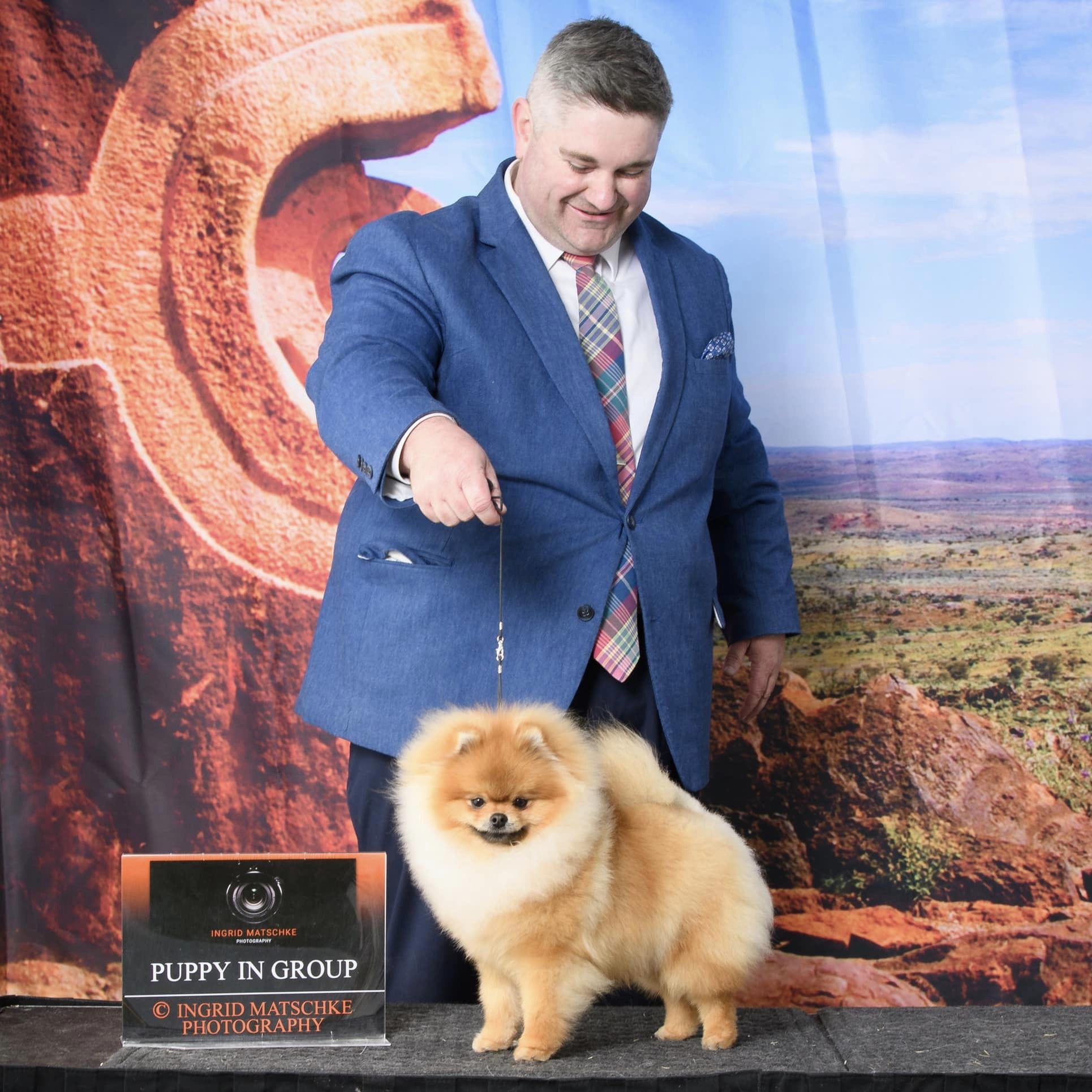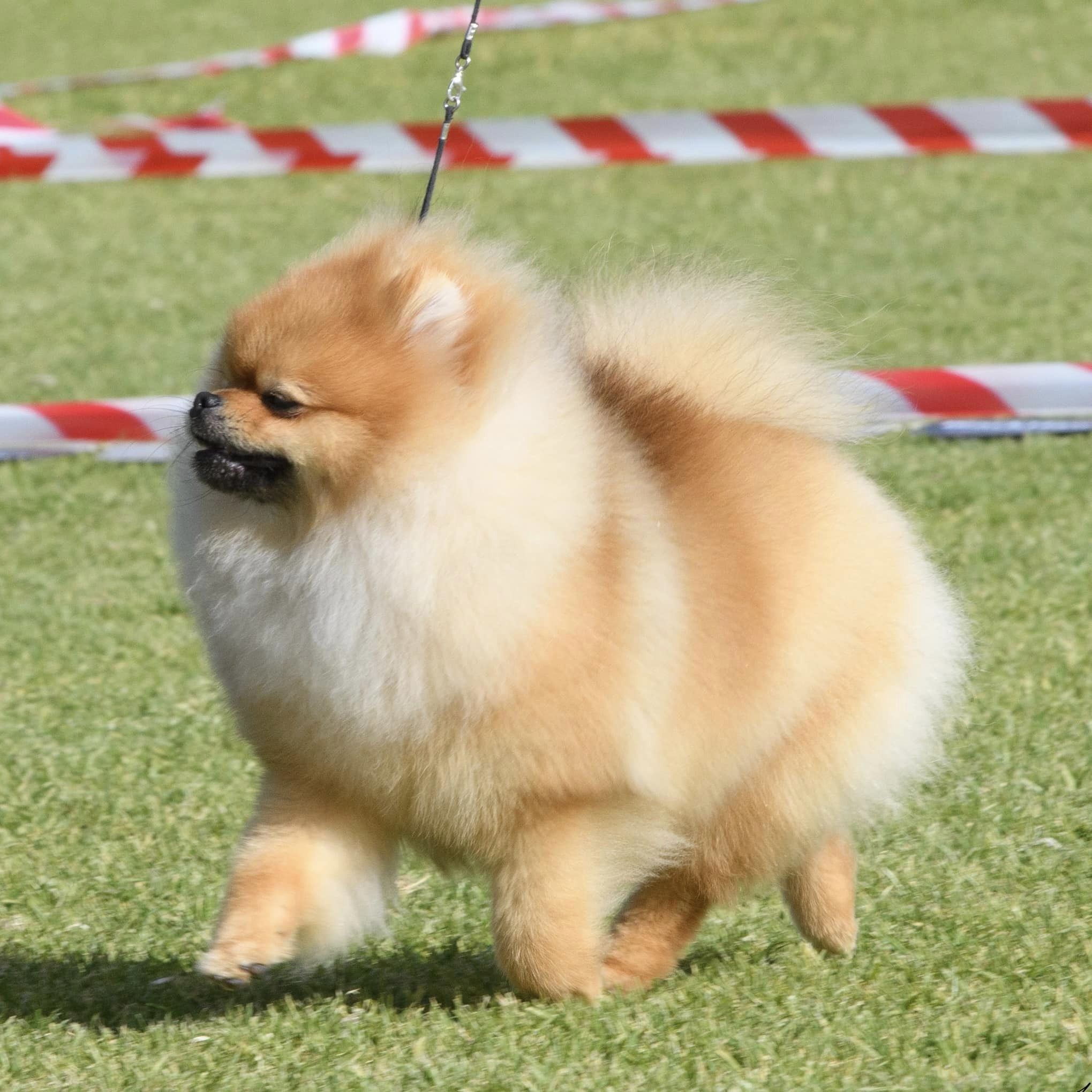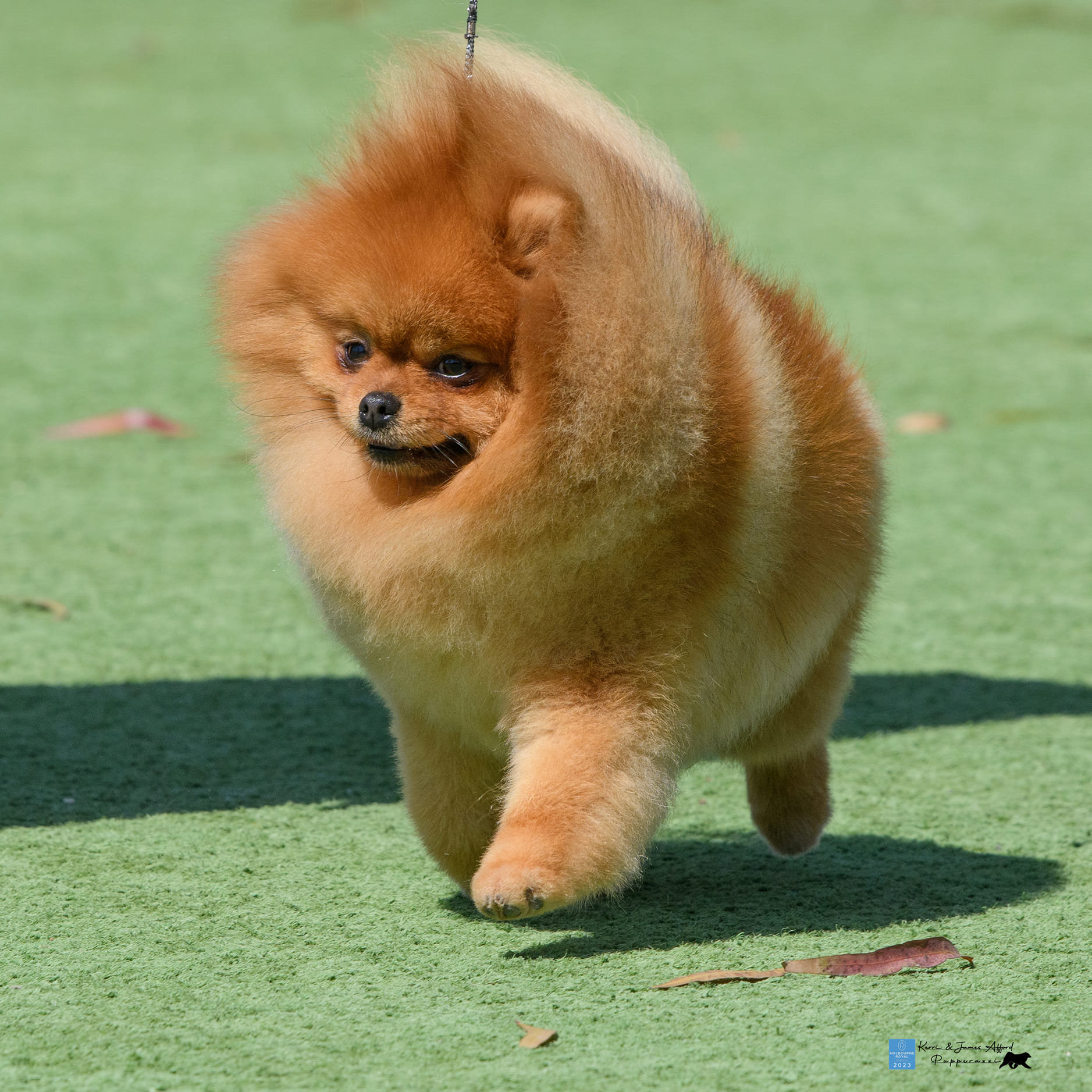Last Updated on 10/06/2022 by Dochlaggie. Post first published on June 10, 2022.
It’s a simple thing for a Pomeranian owner to watch his canine panting and sit there trying to decide if it’s too raspy, too fast, or something else. If you read on, this article, titled Pomeranian Panting Issues Explained, will give you many of the answers you seek.
A very common question we hear owners ask all the time relates to hard panting or heavy panting because it occurs virtually all the time.
A Pomeranian dog pants a lot normally because that’s how he tries to cool off. However, you must understand that panting is really breathing. We take deep breaths and so do our dogs.
However, I’ll discuss unusual breathing…including excessive breathlessness, as it’s visibly obvious and can make you want to consult the vet.
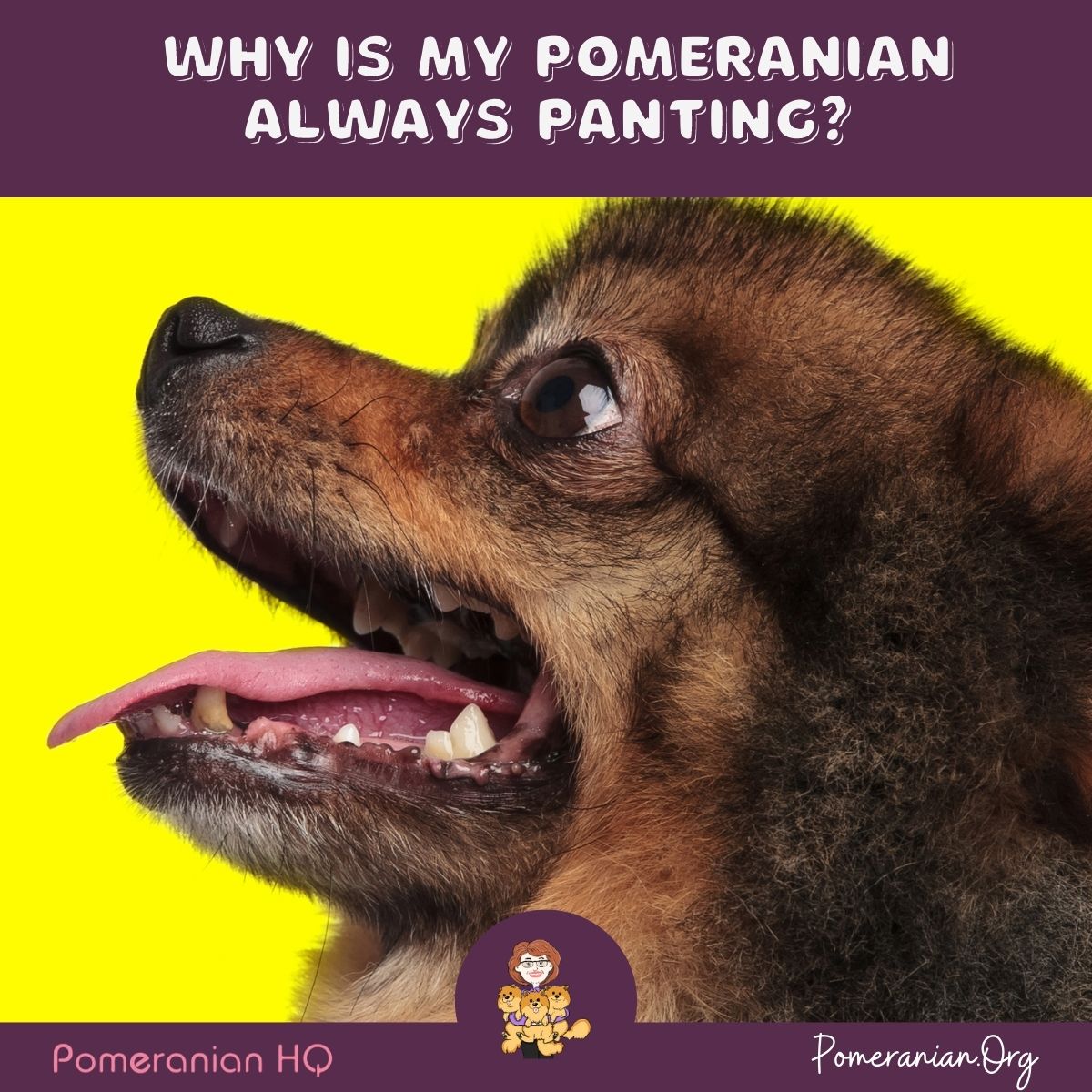
Why Do Pomeranians Pant so Much?
Apart from occurring after exercises, you may ask the question, “Why is my Pomeranian always panting?”
These are a few major reasons:
- Becoming too hot.
- Kennel Cough.
- Pneumonia.
- An enlarged heart (heart murmur)
- Collapsed trachea.
- Fluid in his lungs.
- Excitement.
Although these reasons are top of the long list, you must also consider other factors.
Heavy panting, on the other hand, might indicate that your dog has a severe health issue, or and been through a life-threatening trauma.
Read on to learn what to look for if your Pom pants excessively.
Every time I watch my Pomeranians running around the house or playing together in my big backyard, they always finish up with a big drink from their water bowls and plenty of panting.
Pomeranians are extroverts, so when they expend energy, it’s just part of the exercise as they need extra energy. It’s normal to observe your dog while he pants after a period of exercise or a minute of the excitement. However, if he keeps panting, you may wonder why, particularly if the day is warm.
Excitement
Excitement. Happiness and Activity. These are three words that usually occur at the same time. If you’re playing fetch with your Pom outside, or if you just got home and you’re hugging, petting, and playing with him, there are lots happening.
Your dog is excited to be the focus of your attention, especially if you have been absent, and the mere sight of you can make him extra happy. Then add in some physical exercise/game/playing and combine it into a game, and you’ll notice him start panting.
If it’s not a lot, and if your Pomeranian quickly calms down after the activities have subsided, it’s usually not an issue. However, if he sees you and finds it difficult to calm himself, it could be a problem of him getting too excited. One option is to train your Pom not to equate the fact that you have arrived home with a frenzied feeling of excitement.
It will take a lot of willpower on your part, especially at the start. When you get home, don’t greet your Pomeranian straightaway. Ignore him, regardless of what he does to attract your attention. Go inside, put your bag, keys, phone, and anything else you have in their usual spot. Read your mail (if any), wash your hands, and still ignore your dog until this point, until you think the time is right.
Then slowly and calmly pat your dog a few times, without getting him excited. If you’re able to do this and then wait for 20-30 minutes before engaging your dog in some playful fun, it will help him remain fairly calm when he first sees you arrive home.
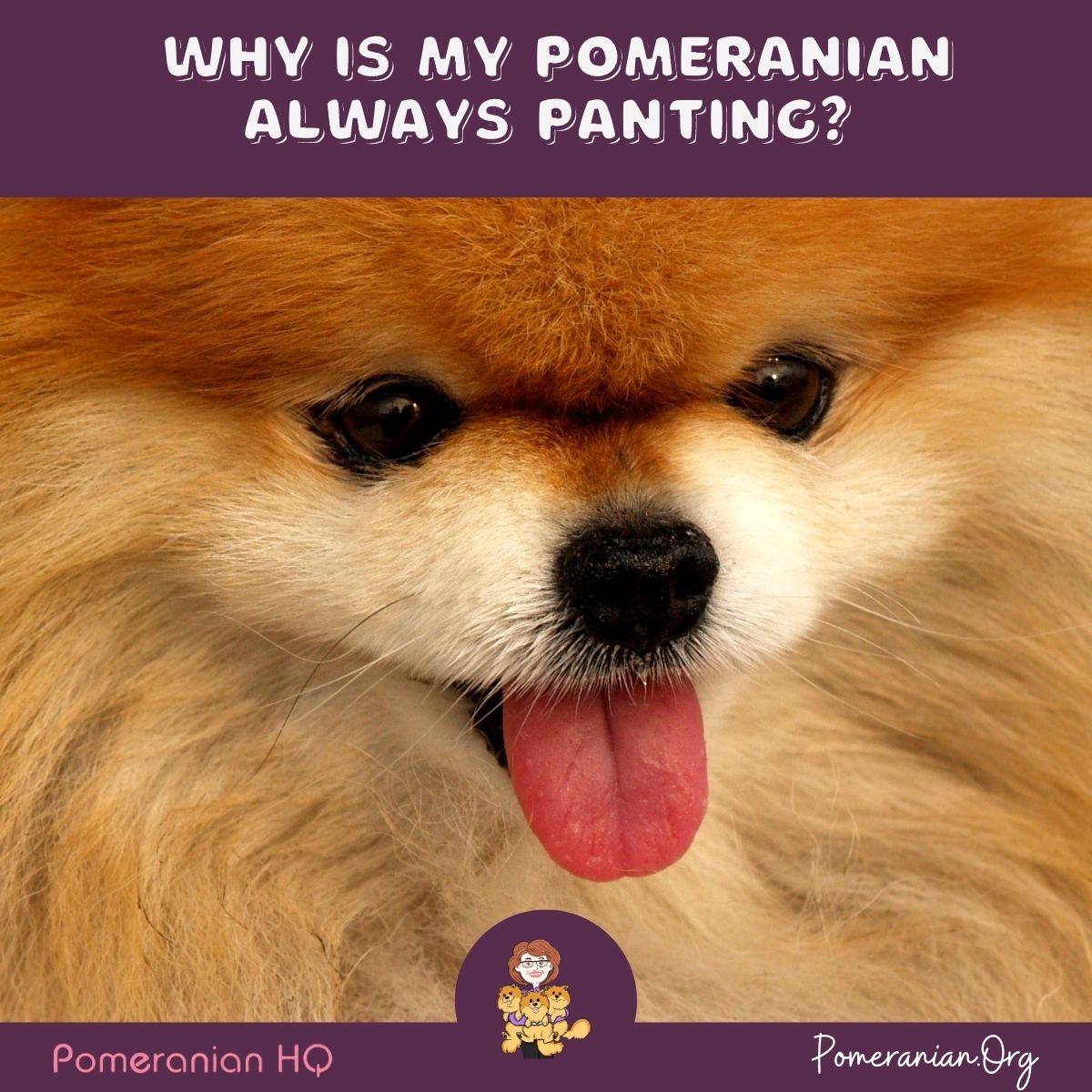
Overheating
The most common reason why you may see your Pomeranian always panting is when he gets overheated. Poms are descended from a line of strong Arctic working dogs and needed thick double fur coats to keep them warm. The inner coat is quite dense and holds in a Pomeranian’s body heat. The outer coat is sparser and lighter and helps to protect the inner coat and brush off any environmental debris.
Excessive panting is also an indication that a dog is suffering from heatstroke or has swallowed a poisonous item.
Immediately consult a veterinarian if a sudden change in your dog’s respiration cannot be explained by an evident cause. Follow the guidelines at the end of this article to safely cool your dog if you suspect heatstroke.
Collapsed Trachea
Sitting high on the list of Pomeranian health troubles is a collapsed trachea. This occurs when the cartilage that circles a dog’s windpipe begins degrading and falling to pieces. The end result is a smaller air passage your Pomeranian can use to breathe. This will get your Pomeranian breathing heavy so you must monitor his breathing very carefully.
Other Possibilities
There are other possible explanations behind why your pet Pom is panting excessively such as chronic disease heart failure, Cushing’s syndrome, and respiratory illnesses are all conditions that can induce heavy breathing or panting in dogs:
Heart failure: Dogs, like humans, can suffer from heart failure. Dogs, like humans, may exhibit some of the same symptoms, such as trouble breathing, decreased activity tolerance, and coughing.
Cushing’s disease: This happens when a dog’s adrenal glands create an excessive amount of cortisol. Excessive appetite, thirst, urination, hair loss, and a pot-bellied look can accompany intense panting. Treatment options vary but may involve adrenal-suppressing medications or surgery.
Pneumonia: Respiratory problems Several respiratory conditions, including laryngeal paralysis, pneumonia, and lung tumors, can cause heavy breathing or panting. Treatment is determined by the severity of the ailment and how far it has progressed.
Fluid in his lungs, kennel cough, obesity, eating too much food all the time, or he might have caught something from a different pet.
Pain and injury: Dogs cannot verbally communicate when they are in pain. It is therefore our responsibility to know the reason for your dog’s pain. Heavy panting is an indication that your dog may have been injured.
Other indicators of pain or trauma in animals include dilated pupils, a decreased appetite, a reluctance to lie down, restlessness, anxiety, and licking or biting at the region of discomfort.
Eclampsia: commonly known as milk fever, can cause heavy breathing or deep, strong panting. Eclampsia is a serious ailment that affects nursing mothers; low calcium in the blood causes difficulty to stand or walk as well as tremors. In addition, allergies, illness, or inflammation of the airways in dogs can produce wheezy, loud breathing.
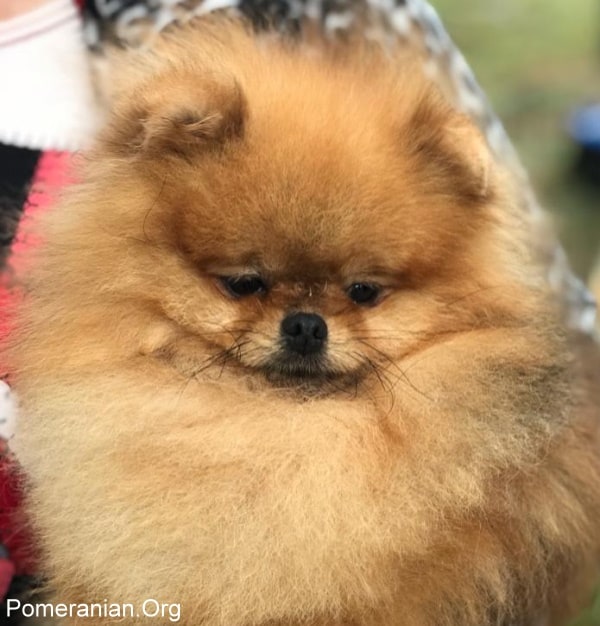
The great news is that a quick visit to the vet can solve all of these problems and then you’ll have your Pomeranian back to his happy, healthy self again.
Decreasing Your Pomeranian’s Panting
There are a few ways you can decrease the amount of puffing your Pomeranian is doing. Giving him a haircut may help and Poms are very cute when all puffed up, a fact to which they’re well aware. Sadly, it might cause his body to overheat so he’ll pant more than he should. The same thing applies if you put your dog into any clothing because those items keep the heat in.
If the size of his heart is the issue, decreasing his panting will be difficult. The only way to fix this cause is through consultation with the vet. The most likely suggestion will be surgery, which is always risky. First, the vet must discover whether your Pom has a lot of discomfort or is in constant pain. Then you’ll work out the feasibility of him undergoing surgery.
If your Pomeranian’s trachea has collapsed, he’ll definitely be panting too much. A collapsed trachea is number one on the list of main health troubles your Pomeranian can endure. To ease the discomfort if your Pom has a collapsed trachea is to take him for walks and use a no-pull harness instead of a collar. All owners know their Pomeranians are eager to run, and it means they tug on their leash. A harness might also decrease how much he pants.
There are numerous reasons why obesity may cause trouble for Pomeranians. They’re so cute when they sit and beg for food, and it makes you want to give in and feed them the wrong foods.
Poms and other smaller breeds have a slower metabolism so it’s critical that you only feed them the amount of food their body needs. Pomeranians that are obese have trouble with their breathing, so exercise is good as a way to stop them from panting too much.
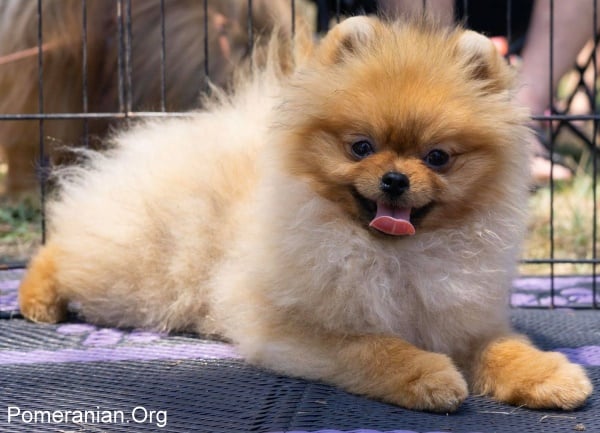
Is Your Pomeranian Panting Too Much?
You probably feel sorry for your Pomeranian when he’s panting too much. If he’s enjoying himself playing, it’s obvious that he’ll be panting heavily. On the other hand, if he’s sitting still and relaxing, and panting, it’s a definite indicator that further investigation is required.
A Pom at rest will remain at rest. If your Pom is panting or breathing too much while inactive, means they’re panting isn’t normal. If he’s excited and happy, it’s natural for him to breathe more than usual. Make note of his breathing patterns while he’s resting as you can see lots of useful things during this time.
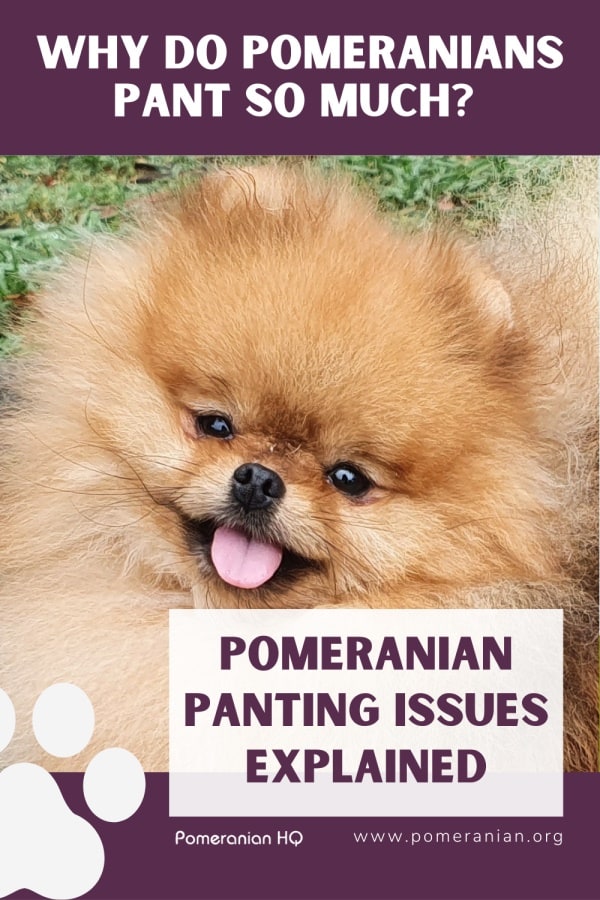
To identify if your Pomeranian is panting a lot more than he should is to watch him and see if he tires much quicker during his usual play times. While sounding odd, the logic is that if he’s having fun AND has panting troubles, he can’t play for long.
I have a Pomeranian who does pant more than normal, due to a collapsed trachea. I originally noticed it because, whenever he would play with his sisters and brothers, he was the first one to stop. He would always be panting, long after he had stopped. That told me to contact the vet for advice as there was a problem.
When we all went for walks, he was always the first dog to become too tired to keep going. I needed to pick him up and carry him all the way home. Tiredness is a major reason why your Pom pants a lot.
The Weather Can Affect Their Breathing
I mentioned earlier that the Pomeranian breed has descended from Arctic working dogs, specifically the German Spitz breed. It’s the reason why Pomeranians have two coats that are dense, thick, and big. However, in particular weather conditions, they may have a changed breathing pattern, which might be why
If your Pomeranian pants excessively, the cause may be the environment which is humid and warm. A Pomeranian’s coat isn’t suited to this climate so you’ll need to find ways to cool him down. Keeping his hair short is a very useful way to help.
If your climate is humid and cold, it’s possible that the problems may be similar.
Obviously overheating won’t be an issue. However, humidity may cause your Pom to get kennel cough, catch pneumonia or some other lung disease, or maybe just liquid in his lungs. If this happens, put a coat, blanket, or sweater on your Pom so he’ll keep warm. This will help clear his lungs and his immune system overall, and it will look so cute.
Panting at Night
When your pom is asleep at night, you should hear your Pomeranian breathe, but he should not be loudly panting. It’s normal for dogs to have dreams and, while it’s happening, have moments of heavy breathing.
It’s theorized that, while they’re asleep, dogs will dream about things that have occurred recently. It means your dog will dream about running around the yard or going for walks. Many canines will move their legs in the same way they run…and others will even pant. It will just be a momentary lapse before his breathing returns to its normal point.
Do Pomeranians Become Overheated?
It’s easy for Pomeranians to get overheated due to their double coat. The inner coat keeps the heat in and the outer coat acts as protection for the warm inner coat. They have two coats because their ancestors were Arctic dogs.
Do Pomeranians Find It Difficult to Breathe?
As with other small dog breeds, Pomeranians are highly susceptible to genetic troubles that cause breathing problems.
Pomeranians commonly have trouble with breathing because of: an enlarged heart, a collapsed trachea, and overheating
Do Pomeranians Snore?
Like many other dogs, Pomeranians can snore when they’re asleep. The main reason Poms snore is because they’re possibly overweight.
Because they can be prone to Pomeranian breathing issues that are common for this to result in snoring. The main reason Pomeranians snore is because they are potentially overweight.
Rule out Medical Conditions
If your Pomeranian is panting hard and often, it’s best to have a checkup by the vet.
There are some very serious ailments in which panting is a symptom including an enlarged heart, fluid in his lungs, kennel cough, collapsed trachea, Cushing’s Disease, and pneumonia.
Panting and Vomiting
If both of these conditions are occurring at the same time, this means that you must take your Pom to the vet or animal hospital urgently. Causes can range from poisoning to a lung infection. It’s also true if a dog is dry heaving.
Final Thoughts of Pomeranian Panting
Now you know the answers to the big question – Why Is My Pomeranian Always Panting? It’s important to read up on all the available, legitimate information so you can ensure he lives a long healthy life.
While dogs don’t speak English, they can sure get their message through to you when they become sick. After all, loving your Pomeranian means caring for him when he’s sick as well as when he’s fit and healthy and causing mischief.
Please note: while I do discuss health, care, and behavioral issues, you should never use this information as a replacement for advice from qualified veterinarians, diagnoses, or recommended treatment regimes. If you have any worries about the health of your Pomeranian, your first contact should be your regular vet or, if you don’t yet have one, a vet that works locally. Never ignore or avoid treatment and advice from your vet because of a piece of information you have read on any website.
N.B. This article regarding Pomeranian health issues was written in consultation with our resident veterinarian.
Dr. Muqeet Mushtaq
DVM, University of Animal and Veterinary Sciences, 2019
MSc. (Hons.) (Animal Breeding & Genetics), University of Agriculture Faisalabad, 2021
Copyright Pomeranian.org. All Rights Reserved.
References and Further Reading:
[1] Official Standard of the Pomeranian (AKC). American Kennel Club, 2011.
[2] English Kennel Club Pomeranian Breed Standard, 2017.
[3] Denise Leo, The Pomeranian Handbook.
[4] Milo G. Denlinger “The Complete Pomeranian.”
[5] Kimbering Pomeranians “1891-1991”.
[6] William Taplin’s “The Sportsman’s Cabinet.”
[7] E. Parker “The Popular Pomeranian.”
[8] Lilla Ives “Show Pomeranians.”
